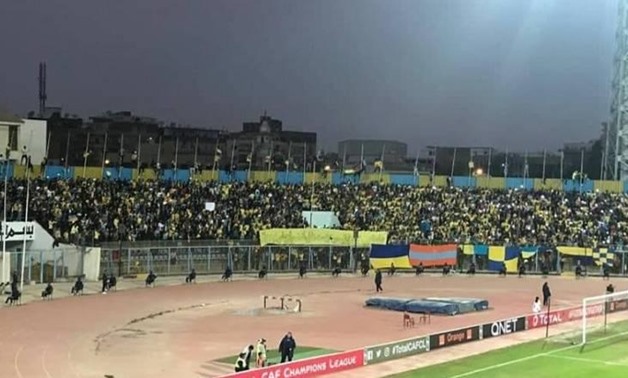The Ministers of Defence from Turkey and Qatar arrived in the Libyan capital, Tripoli, on Monday in preparation for discussions between the two sides, Turkish news agency Anadolu and Sky News Arabia reported.
Turkey’s Chief of General Staff, General Yasar Guler, also participated in the visit, as Turkish and Qatari officials met with officials from Libya’s Government of National Accord (GNA).
According to Anadolu, the visit aims to discuss “the activities carried out under a memorandum of understanding (MoU) between Turkey and Libya.”
However, sources told Al Arabiya that the officials will discuss “military situation east of Misrata, and developing a plan for an attack on Sirte and Jufra.” They added that the talks will also focus “on developing the military airbase at Al-Watiya and provide it with advanced military equipment.”
Ali Al-Takbali, a member of the Tobruk-based Libyan Parliament’s defence and national security committee, told Daily News Egypt that the Turkish-Qatari visit is likely to discuss a plan for an attack on Sirte or Jufra.
“Here is a country that practices terrorism and another which backs it, so we expect what they will discuss?” Al-Takbali said.
“Turkey has brought more than 20,000 mercenaries to Libya so far, including Syrian and Somali nationals, as well as Islamic State (IS) fighters to spread terrorism in Libya and promote fuel conflict,” he added.
“We blame the international community for the situation in Libya, and Turkey for supporting the GNA continues, so both are not committed to the ceasefire. Turkey wants to build up bases to attack vessels in the Mediterranean Sea and other spots in Libya,” Al-Takbali elaborated.
Egypt has warned against crossing the “Sirte and Jufra red-line” by any forces or militia. In July, Egypt Parliament authorised a military action in Libya to protect the country’s national security in the Western Strategic Front against terrorists.
Sirte is over 1,000km from Egypt’s western borders, while the Jufra Airbase, one of Libya’s biggest bases, is located 300km south of Sirte.
Meanwhile, German Foreign Minister Heiko Maas also visited Tripoli, on Monday, as part of a two-day trip in Libyan capital. He also visited the UAE, travelling to Abu Dhabi for talks to “promote peace in the region,” the German Foreign Office said.
Maas will meet with GNA Head Fayez Al-Sarraj, Minister of Foreign Affairs Mohamed Siala and Minister of Interior Fathi Bashagha. He expects to discuss “ways out of this very dangerous situation and press not least for the establishment of a demilitarised zone around Sirte.”
“The United Nations has submitted a sound proposal for this zone via UNSMIL,” Maas said in a statement, “However, ending the oil embargo and ensuring a fairer distribution of oil revenues are also crucial for resolving the conflict in Libya.”
He added that “both sides [Libyan warring parties] and their international allies are continuing to massively arm the country and holding firm to their preconditions for a ceasefire.”
Moreover, Maas also will discuss this issue alongside the situation of refugees in Libya with Mustafa Sanalla, chairperson of the National Oil Corporation.
Maas will raise the Libyan crisis during his talks in the UAE, as he hopes “to see encouraging signs from Abu Dhabi on the issue of Libya”.
He also noted “The United Arab Emirates is in a position to influence General Haftar, and we expect it to do so, in the spirit of the Berlin Process.”
Monday’s visits came amid a misleading calm around Sirte, following weeks of military mobilisation by Turkey and the GNA. The preparations have been interpreted as a sign of a possible operation to recapture Sirte from the Libyan Arab Armed Forces (LAAF), headed by Commander Khalifa Haftar.
Commenting on the German suggestion, Al-Takbali said that Libyans will not accept establishing a demilitarised zone.
“We agreed on the Berlin Conference process that includes dismantling the militias but this has not happened and Turkey continue to deploy mercenaries to Libya,” he said, adding, “Establishing a demilitarised zone around Sirte will divide Libya and support Turkey to achieve its aims in the war-torn country.”
Al-Takbali added that such a suggestion has been on the table since 2012, but has been flatly rejected by the Libyans.
Also on Monday, Russian President Vladimir Putin and his Turkish counterpart Recep Tayyip Erdoğan held discussions on the Libyan crisis in a phone call. During the discussions, the two leaders emphasised the need for a sustainable ceasefire in the war-torn country.
The oil-rich country has been split between two parties since 2014: namely the GNA which is based in Tripoli and backed by Turkey; and the Benghazi-based LAAF, which is backed by Egypt, the UAE, and Russia.
Turkey has been providing the GNA with drones and air defence systems, weapons, as well as thousands of mercenaries. Thanks to this support, forces allied to the GNA seized, in May, the key military airbase of Al-Watiya, south of Tripoli, from the LAAF. In June, GNA forces took control of the capital’s airport and Tarhuna city, and now controls west Libya.
Earlier on Sunday, the LAAF said it observed IS militants getting ready to join militias allied to GNA in Misrata.
Earlier reports suggest that Turkey is bringing in IS fighters to Libya to fight with the GNA. Al-Takbali confirmed the reports to the Daily News Egypt, saying “There are about 2,500 IS fighters in the war-torn country’s western region.”



